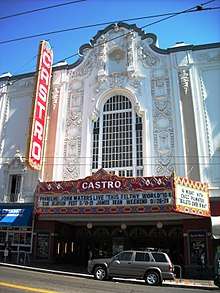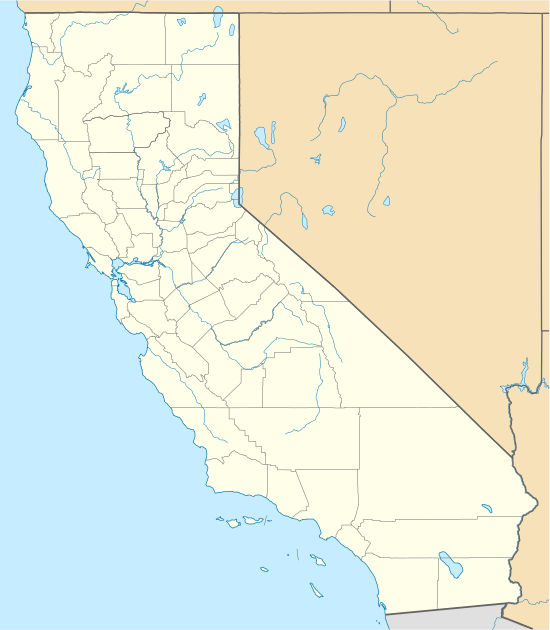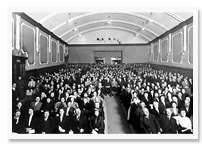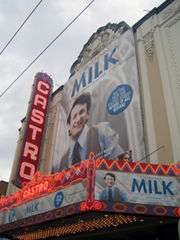Castro Theatre
The Castro Theatre is a popular San Francisco movie palace which became San Francisco Historic Landmark #100 in September 1976.[2] Located at 429 Castro Street, in the Castro district, it was built in 1922 with a California Churrigueresque façade that pays homage—in its great arched central window surmounted by a scrolling pediment framing a niche—to the recently rebuilt basilica of Mission Dolores nearby. Its designer, Timothy L. Pflueger, also designed Oakland's Paramount Theater and other movie theaters in California in that period. The theater has over 1,400 seats (approx 800 downstairs and 600 in the balcony).[3][4] The theater's ceiling is the last known leatherette ceiling in the United States and possibly the world. Another leatherette ceiling was demolished just a few years ago. To make the ceiling look as though it is leather requires a special technique regarded as lost today.
 The Castro Theatre in San Francisco anchors The Castro business district. | |
 Castro Theatre Location within San Francisco County  Castro Theatre Castro Theatre (California)  Castro Theatre Castro Theatre (the United States) | |
| Location | 429 Castro Street San Francisco, California, USA |
|---|---|
| Coordinates | |
| Public transit | Castro Street Station |
| Owner | Nasser Brothers |
| Type | Indoor theater |
| Seating type | Orchestra, Balcony |
| Capacity | 1,400 |
| Construction | |
| Opened | June 22, 1922 |
| Architect | Timothy L. Pflueger |
| Website | |
| www | |
| Designated | 1977[1] |
| Reference no. | 100 |
History
The Castro Theatre originally opened at 479 Castro Street in 1910.[5][6] It was subsequently remodeled into a retail store (currently occupied by Cliff's Variety, since 1971) in the mid-1920s after the larger Castro Theatre was built at 429 Castro Street, its current location, only a few doors up from the original theatre.
The new Castro Theatre opened on June 22, 1922, for an invitation-only screening, with local luminaries such as Mayor James "Sunny Jim" Rolph in attendance, of the Paramount Pictures release Across the Continent (1922), starring Wallace Reid. The new Castro Theatre opened the following day to the general public.
Description
The Nasser brothers, who built the theater and still own it, also owned several other movie houses in the San Francisco area. The interior is luxurious and ornate, with subtly convex and concave walls and ceiling and a dramatic "Mighty Wurlitzer" pipe organ that is played before films and events. The large neon "Castro" sign is emblematic of both the theatre and the Castro District.
Today, the Castro Theatre hosts repertory movies, film festivals, and special events, including gay and multicultural focus, such as the San Francisco International Film Festival, Frameline: the SF International Lesbian and Gay Film Festival, Noir City: The Film Noir Festival, the SF International Asian American Film Festival, the SF International South Asian Film Festival, Berlin and Beyond: German Film Festival, the San Francisco Jewish Film Festival, SF Indiefest, the San Francisco Silent Film Festival, Midnites For Maniacs, and the Shock It To Me! Classic Horror Film Festival. In recent years, the Castro has been the site for gala tributes to many legendary Hollywood stars including Tony Curtis, Ann-Margret, Debbie Reynolds, Mitzi Gaynor, Ann Miller, Kim Novak, Jane Russell, and Sandra Dee—many of the events produced by local impresario Marc Huestis.[7]
In January 2008, for the filming of the Gus Van Sant biopic Milk, restorations were made to the neon on the theater's marquee and blade sign, and the facade was repainted.[8] The movie about the life and times of Harvey Milk, the San Francisco city Supervisor who was California's first openly gay elected official (portrayed by actor Sean Penn, who won an Academy Award for his performance), had its world premiere at the theater in November 2008.
The theater can project modern digital formats such as 4K DCP with 5.1 Dolby sound[9] and can accurately reproduce the classic silent film experience by projecting custom frame rates anywhere between 12 and 30 frames per second, including the ability to speed up or slow down during a film. The Castro is capable of showing 70 mm films[10] and is one of the few theaters in the world that can show a 70 mm film with separate DTS soundtrack.[11]
The Castro Theatre is located on Castro Street near the intersection of Market and 17th Streets, across from the Castro Street Station on the Muni Metro subway.
Gallery
 The original Castro Theatre located at 479 Castro Street
The original Castro Theatre located at 479 Castro Street The extravagant interior ceiling with Art Deco chandelier made by Phoenix Day Lighting, as it appears in the darkened movie hall
The extravagant interior ceiling with Art Deco chandelier made by Phoenix Day Lighting, as it appears in the darkened movie hall Castro Theatre running Milk November 2008
Castro Theatre running Milk November 2008
See also
- List of San Francisco Designated Landmarks
- Roxie Cinema
- Victoria Theater
References
- "City of San Francisco Designated Landmarks". City of San Francisco. Archived from the original on 2014-03-25. Retrieved 2012-10-21.
- San Francisco Preservation Bulletin No. 9 (PDF), January 2003, archived from the original (PDF) on 2012-02-15
- The History Of The Castro Theatre, archived from the original on 2019-06-17, retrieved 2011-05-02
- Film-Noir-Alley.com - The Castro Theatre, archived from the original on 2010-05-23
- Stack, Peter (22 May 2001), "Longtime owners to take over Castro Theatre", San Francisco Chronicle, retrieved 2008-10-28
- Cliff's Variety: The 4th Store, retrieved 2008-10-28
- Wiegand, David: "Marc Huestis grew up wanting to be either and actor or president. Now the filmmaker and camp impresario is using his showmanship to promote peace" , San Francisco Chronicle, July 16, 2003
- Krefft, Bryan (4 February 2008), ""Milk" Filming Benefits the Castro", Cinema Treasures, retrieved 2008-10-28
- Seth Wolf. "Johnny Ray Huston. ''Coming soon?: A shake-up at the Castro Theatre brings change—and perhaps big trouble—for movie lovers in San Francisco.''". Sfbg.com. Retrieved 2014-06-29.
- "Scott E. Norwood. ''US 70mm-capable Theatre Listing''". Redballoon.net. Retrieved 2014-06-29.
- "in70mm.com. Thomas Hauerslev. ''What is DTS 70mm?''". In70mm.com. Retrieved 2014-06-29.
External links
| Wikimedia Commons has media related to Castro Theatre. |
- Official website of the Castro Theatre